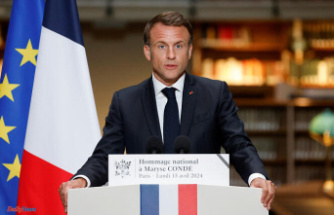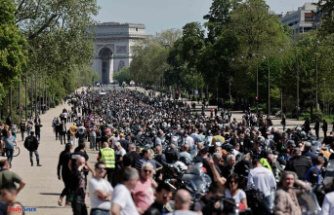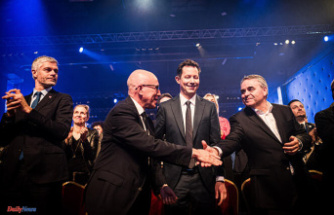After the repeated shelling of Europe's largest nuclear power plant, Zaporizhia in Ukraine, Russia is equipping the plant it occupies with its own anti-aircraft defense system. "The power plant's air defense systems will be strengthened," Yevgeny Balitsky, head of Moscow's military administration in the region, told Russian state television.
The nuclear plant in southern Ukraine, which is under Russian control, has been hit with rockets several times in the past few days, sparking international concerns about the safety of the facilities. Moscow and Kyiv blame each other for the attacks. According to local and Moscow sources, an ammunition depot at an air force base on the Black Sea peninsula of Crimea, annexed by Russia, exploded.
A European emergency plan came into force to prepare for a possible halt to Russian natural gas supplies. It is intended to significantly reduce gas consumption throughout Europe by next spring. A study published on Tuesday by several research institutes comes to the conclusion that the Ukraine war will cost the German economy more than 260 billion euros in added value by 2030 and could lead to job losses as early as next year.
Russian Military Administration: Akw is operating normally
According to the Russian military administration, the Zaporizhia nuclear power plant is currently operating normally. Power lines and damaged blocks of the kiln have been repaired, said the head of the authority, Balizki. Zaporizhia is the most powerful nuclear power plant in Europe. According to Ukrainian sources, three out of six blocks were still in operation before the shelling at the weekend.
So far, Russia has refused to allow experts access to the facility. According to Moscow, it now wants to allow a visit to the International Atomic Energy Agency. "From our side, we are ready to provide the maximum possible support to resolve organizational issues," the Russian Foreign Ministry said. At the same time, Moscow accused the United Nations of allegedly canceling an inspection trip that had already been planned, thereby causing a new escalation.
Explosion on the Crimean peninsula at an air base
According to local and Moscow sources, an ammunition depot at an air force base on the Ukrainian Black Sea peninsula of Crimea, annexed by Russia, has exploded. Videos circulating on social networks also showed explosions and large clouds of smoke, which are said to have been recorded near the town of Nowofyodorovka, not far from the seaside resort of Yevpatoria. One person was killed, Crimean boss Sergei Aksjonov said, according to Russian agencies. At first it was said that there were no victims.
Tourists fled the area. Aksyonov said that an area within a five-kilometer radius around the base would be cordoned off. He did not comment on the cause of the explosion. Observers assumed an act of sabotage because the Ukrainian troops are more than 200 kilometers away. According to previous reports, the Ukrainian army does not currently have missiles with this range. A source in the Russian Defense Ministry cited a violation of fire safety rules at the base as the most likely cause. There is no indication of an external influence.
Intelligence agencies: Russia focused on defense in southern Ukraine
According to British military experts, Russian troops have focused their efforts in recent days on repelling a Ukrainian counter-offensive in the south of the country. Nevertheless, the Russian attacks in the eastern region of Donetsk have continued, according to the daily intelligence update from the Ministry of Defense in London.
Latvia: State of emergency extended at border with Belarus
Latvia has extended the state of emergency on the border with Belarus until November 10. That was decided by the government in Riga. The state of emergency has been in effect for almost exactly a year. It was decided in August 2021 because thousands of migrants wanted to get to Poland or the Baltic States via the EU's external borders. The European Union accuses the Belarusian ruler Alexander Lukashenko of bringing migrants from crisis regions to the EU's external border in an organized manner.
Kremlin criticizes demand for a travel ban for Russians
The Ukrainian demand for an international travel ban for all Russians has triggered heavy criticism in Moscow. The statements by Ukrainian President Volodymyr Zelenskyy were received "extremely negatively," Kremlin spokesman Dmitry Peskov said, according to the Interfax agency. Zelenskyj had previously told the Washington Post: "The most important sanctions are to close the borders, because the Russians are taking their land away from others."
For Interior Minister Faeser, Putin is a war criminal
Interior Minister Nancy Faeser regards Russian President Vladimir Putin as a war criminal for his war of aggression in Ukraine. Faeser answered the question "Do you think Vladimir Putin is a war criminal?" at the "RND on site" series of events organized by the German editorial network in Potsdam with a resounding "Yes".
"Of course, this is subject to the preservation of evidence and the rule of law," said the SPD politician. But in view of the suffering that Putin has caused in Ukraine, one can probably call him a war criminal. At the end of July, Faeser visited the Ukrainian capital Kyiv and the war-ravaged city of Irpin together with Federal Labor Minister Hubertus Heil.
Studies: War costs jobs in Germany
According to a study by several institutes, the Ukraine conflict is leading to job losses in Germany. In the coming year, around 240,000 fewer people could therefore be employed than without the war; the average for the years 2022 to 2028 would be 150,000 people. In addition to the Institute for Labor Market and Vocational Research (IAB), the Federal Institute for Vocational Training and the Society for Economic Structure Research were also involved in the study. The study predicts the strongest effects on the labor market in the hospitality industry, in social services and in food production.












